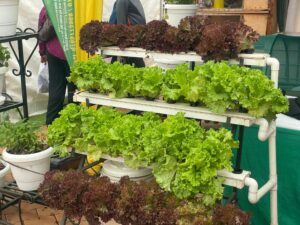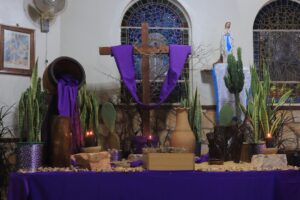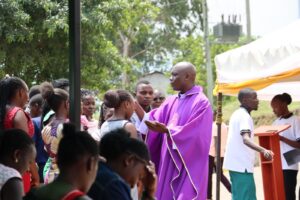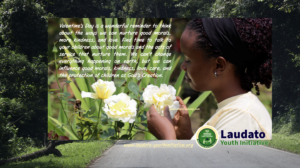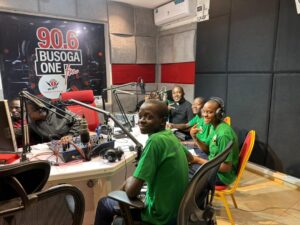The last week of February was a steppingstone for UIW in terms of climate action. It all started with the visit of Linda Sandish, Laudato Si´ Movement – Texas Chapter Animator, and another of its representatives, Maria Treviño, Texas Program Coordinator Laudato Si´ Movement, to San Antonio. During their time in the city, they visited the Headwaters Sanctuary with Arthur Dawes, a Pax Christi member, and toured around the UIW Solar house under the guidance of Mr. Daniel Potter, UIW Sustainability Office Operations Manager. They also shared knowledge and experiences with members of the faculty. Afterward, they set up a table at the SEC to invite and encourage students to sign up and complete the Laudato Si Animator Online Program in the upcoming months. This program gives people the right tools to learn and understand better the message that Pope Francis wrote in his encyclical “Laudato Si” so that they can reflect on the importance of ecological conversion and start taking action in their communities.
During the middle of the week, on Thursday night, the “Green Game” took place. Students volunteered under the direction of Dr. Miele to quantify how much trash was generated throughout the game and the percentage that could be recycled and composted. These kinds of games have been recurring over the past two years, and they are a great way to create awareness of the amount of trash generation and how much of it could be reused and recycled.
To close off the week, Sr. Martha Ann Kirk, influenced and inspired by African art, dance, and African women theologians, organized a meeting on Saturday, March 2nd, with the Laudato Youth Initiative leaders and the Laudato Club of Mountains of the Moon University – Fort Portal Uganda to discuss the possibility of a partnership whose sole purpose will be enhancing research and working together towards a more sustainable future by building a stronger program that encompasses international activities. Uganda is a country in East Africa with rich biodiversity. Brother Adolf, a UIW alumni, now serving his community in Rome, invited UIW students and faculty to meet the Laudato Youth Initiative leaders and Students who mentor “Laudato Clubs” in East Africa, an Initiative that grew from his UIW graduate school research on the use of “digital media to communicate Laudato Si” that started 3 years ago in Uganda but now growing to Kenya and Tanzania. There are currently several clubs existing in junior schools, high schools, universities, parishes, and communities in E.A to close the intergenerational gap that exists in the efforts of climate action. In his point of view, old people have wisdom and experience, and the youth have the energy it takes to unite for climate action, so it is important to be mentors and inspire others. His focus is on using media to inspire climate action, research, documenting stories in a simple way to amplify young people’s voices for sustainability and Mentor leaders thus empowering young people to lead for the change they desire to see in the future. Part of this mentorship includes figuring out ways to get people the message that what they do matters so that they can carry on their activities without being stopped by climate anxiety, just as Dr. Hooker, UIW faculty member in Environmental Sciences, stated: “As people become aware they start to despair.” We need different practices in our daily lives and more efficiency in our resource use without spreading negativity and hopelessness: “People are powerful, and they can really do something to help.”
Some of the UIW student leaders that attended this meeting were Daisy, first-year student President of the African Student Organization with the vision of creating a space for people to connect and celebrate their culture; Liz, a member of the African Student Association invested in reversing the climate change; and Andrea Gómez Jackson, UIW Sustain President. These leaders attended the meeting to share experiences with other young leaders across the world and learn from what they are doing to replicate the strategies that have worked best on their campus; just like Liz said, “There is goodness in the world worth fighting for and I might as well be part of that fight.”
Brother Adolf, alongside Brother Patrick, who is finishing his doctorate studies at UIW in organizational leadership while working in the Young Women´s Global Leadership Program (YWGLP), and Mr. Bernard Kahwa, leader of Laudato Youth Initiative in Uganda and Media and Communications lecturer at Mountains of the Moon University, have inspired hundreds of young men and women to participate and take action in various ways. Mr. Kahwa explained how the university´s radio program has hosted multiple discussions about environmental issues because that is one way to direct its messages to a specific population sector. You have to “take advantage of the youth´s knowledge use of social media and new technologies to share content.” They also publish a quarterly Magazine ‘Laudato Voices’, podcasts, and documentaries. His way of letting the younger ones understand the issue and contribute with their own solutions is by media content, leading to some research questions such as “How can the radio station be used in the fight against climate change?”
Denis Batageka, the media advisor of the Laudato Youth was also present. Other members of the Laudato Club of Mountains of the Moon University, such as Doreen Tukamasuba the club leader, Fred Ayebale the secretary, and their Laudato Youth Initiative Club’s President Sarah Kirikumwino, were present at the meeting discussing some of the challenges and strategies they have implemented in Uganda in their schools. Sarah highlighted that what makes them successful is that their activities are not intended to end in school, but rather transcend to their students´ communities. They host Laudato Masses where they pray together for Mother Earth´s renewal and incorporate liturgical dances, Plant trees to mark events like Birthdays, major Earth Days, Season of Creation, Laudato Si week etc. This year their focus is on indigenous trees for forest cover restoration and fruit trees ton enhance nutrition and food security. During community or school cleaning they collect plastic waste materials and use them to make flowers, dustbins, art pieces made with straws. Items like dustbins are given back to the community to help collect plastics. High school clubs use creativity and innovation to develop projects for their class curriculum like green vegetable gardens and nursery beds at school. Having read Laudate Deum this year they have set up a Laudato youth one million tree planting drive. This is one of the largest projects they are working on. The clubs have as a goal to plant one million trees in the period from January 28, 2024, to January 28, 2025. They use inspire communities, individuals, Laudato clubs and festivals as a way to invite the community to participate, where they are now inviting companies and individuals to donate trees and encourage people unable to plant a tree to donate trees for others “if you cannot plant a tree, can you donate a tree for us to plant on your behalf.” Every time they plant a tree, they name it, making it part of their family, which animates people to take care of it in the years to come. Dr. John Hooker remarked a research opportunity would be to track down where all the trees are planted, document them using GIS, and create yearly surveys to ensure the trees are healthy and thriving. After that, they can track the amount of CO2 that has been removed from the environment and use that as a more powerful message for the audience.
Using the tools at hand, the wisdom of the older generations, and the youth´s innovation, creativity, and energy, these group of people are striving to empower and influence others to take action. As they strive to mobilize their communities to care for our common home while achieving climate and ecological justice, especially by conducting research in land sustainability and comparing climate strategies that have been used in America as well as other parts of the world to learn more and replicate those with good results. The intergenerational gap that is in the climate fight can be disastrous, but if people can close it down, that is when radical change will happen. Using the voice and power of every generation is how we will turn around life on Earth, just as Brother Adolf said: we need to be “united for climate action.” Let the Laudato Clubs in Uganda be not just an inspiration for the UIW campus, but a challenge.
Andy Gomes
UIW Sustain President




